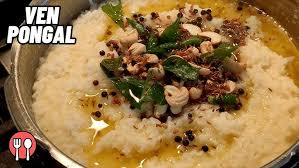Ven Pongal is a traditional South Indian dish
made with rice, split yellow mung dal, ghee, cumin, ginger, pepper and curry
leaves. The word “Venn” means “White” in Tamil and “Pongal” means “to
bubble & overflow” which signifies abundance. It also refers to this rice
lentil dish.
The Tamil month of Margazhi and
the Ven Pongal are closely linked in several ways:
Poet-saint Andal wrote about
pongal in her Thiruppavai.
Pongal is a popular dish
served in temples during Margazhi. The sweet akkaraadisil and savory Venn
Pongal are traditional dishes served in temples during Margazhi.
Ven Pongal is prepared almost
every day during the Tamil month of Margazhi because it is considered a
highly auspicious and devotional month, where people often partake in religious
practices and offer food to the Gods, and Ven Pongal is seen as a simple yet
significant offering due to its symbolic connection to abundance and
prosperity, representing the overflowing of blessings in one's life when
prepared correctly; this aligns with the spiritual focus of the month
where people are dedicated to prayer and devotion.
Key points about this practice:
Symbolic meaning:
The act of the rice
"overflowing" while cooking Pongal is seen as a representation of
abundance and prosperity, which is particularly meaningful during a spiritually
focused month like Margazhi.
Religious offerings:
Ven Pongal is often offered to
deities in temples and at home as a part of daily prayers during
Margazhi.
Cultural significance:
Margazhi is a time for increased
devotion and cultural activities like music and dance, preparing Ven Pongal as a
part of the overall devotional practices.



No comments:
Post a Comment